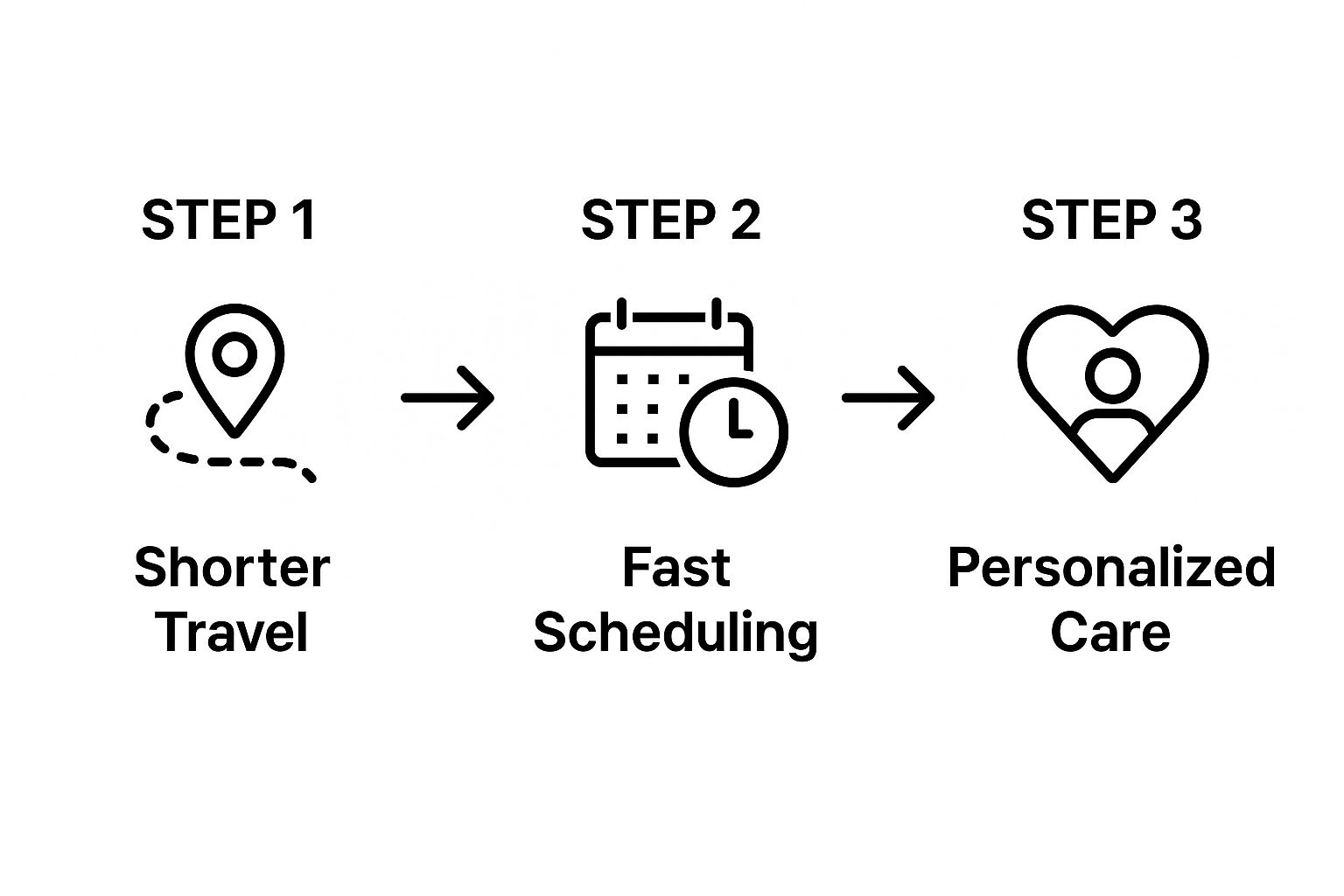When that nagging ache in your back starts dictating your daily schedule, the search for a "back pain clinic near me" quickly becomes a top priority. A specialist clinic offers a focused approach with the right diagnostics and treatment plans for spinal health. It's the clear path forward when general advice just isn't cutting it anymore.
Your First Step to Lasting Back Pain Relief

Living with persistent back pain can feel isolating, but it's an incredibly common problem. In fact, statistics show that around 80% of the UK population will experience it at some point.
The good news? The vast majority of cases aren't caused by anything serious. Over 90% of back pain episodes get better within 6 to 12 weeks.
But when the pain is disrupting your work, sleep, or ability to enjoy life, waiting it out isn't a practical solution. This is where getting specialist care makes a real difference. A dedicated clinic moves beyond temporary fixes to find the root cause of your discomfort. Seeking a professional evaluation is the first step toward getting the right treatment and starting your journey to recovery.
Differentiating Between Acute and Chronic Pain
First things first, it's helpful to understand the nature of your pain. Is it a sudden, sharp pain from a specific incident, or a dull, persistent ache that's been lingering for months?
- Acute Pain: This is typically short-term, lasting from a few days to a few weeks. It often comes from an injury, like lifting something too heavy or a sudden awkward movement.
- Chronic Pain: This is pain that continues for 12 weeks or longer, even after the initial injury or cause has been treated. It almost always needs a more in-depth approach to manage properly.
Knowing which category your pain falls into helps you explain what's going on to a healthcare professional and sets the stage for a more accurate diagnosis. If you're dealing with long-term discomfort, finding a solution becomes even more critical.
A targeted treatment plan isn't about masking symptoms. It's about correcting the underlying mechanical or functional issues to provide lasting relief and stop the pain from coming back.
The Importance of a Precise Diagnosis
Generic advice like "rest more" or "take painkillers" often falls short because it doesn't address the specific reason for your pain. A specialist clinic uses a detailed diagnostic process to get to the heart of the matter.
This usually involves physical assessments, a thorough review of your health history, and sometimes advanced imaging to get a crystal-clear picture of what's happening inside.
This detailed evaluation is the foundation of a personalised treatment plan. Instead of a one-size-fits-all solution, you get care designed for your unique condition, lifestyle, and recovery goals. For a deeper dive, exploring this resource on understanding your back pain can provide some really valuable context.
Taking this proactive step empowers you to find a solution that actually works, turning that search for a clinic into a definitive move towards a pain-free life. It's time to take control and book an appointment with a specialist.
How to Find the Best Local Back Pain Clinics

So, you're ready to find some help. Most people start by typing "back pain clinic near me" into Google, and while that’s a start, it’s not enough to find the right help. You need a bit more focus if you want to find a clinic that's a perfect fit for you.
The aim here is to create a solid shortlist of reputable clinics that actually specialise in whatever is causing your pain. This begins with getting smarter with your online search.
Instead of just a general query, get specific. Think about what you're actually dealing with. For instance, searching for "sciatic nerve pain specialist Milton Keynes" or "lower back pain clinic near MK10" will cut through the noise. Adding your postcode or a specific symptom immediately filters out the irrelevant options and gives you a much better starting point. It’s a simple change, but it means the clinics you find are far more likely to have seen and successfully treated your kind of problem before.
Looking Beyond the Clinic’s Own Website
Once you have a few names, it’s time to do some digging into their reputation. Don’t just take their word for it by reading the glowing testimonials on their homepage—you need to see what real patients are saying on independent platforms.
- Patient Review Sites: Places like Google Reviews or Doctify are goldmines for honest feedback. Look for patterns in what people say. Do patients consistently mention feeling listened to? Do they talk about the staff’s professionalism or, most importantly, successful results?
- Professional Health Directories: This is your fact-checking stage. Official registers from healthcare governing bodies can confirm a practitioner's credentials and their listed specialisms. It’s a reliable way to make sure you’re only considering properly qualified professionals.
A single bad review isn’t always a deal-breaker—sometimes people just have a bad day. But a consistent theme of poor communication, disorganised appointments, or unresolved pain is a massive red flag. Your research will lead you to a clinic you can trust.
Finding the right clinic is about more than just qualifications; you're looking for a team that is not only highly skilled but also compassionate and genuinely focused on your well-being. Patient reviews are often where you'll discover how well a clinic delivers on the human side of healthcare.
The Value of a GP Referral
Another brilliant route to take is simply talking to your GP. They often have working relationships with local specialists and can give you a referral based on their professional experience and, crucially, their understanding of your medical history.
A GP referral can cut straight to the chase, pointing you towards clinics and specialists with a proven track record for treating conditions just like yours. They can also help you figure out the next steps, whether you’re using Private Medical Insurance or paying for the treatment yourself. By following these steps, you can confidently choose the right clinic and take the first step towards getting the relief you need.
Evaluating a Clinic’s Specialists and Treatments
So, you’ve got a shortlist of clinics. Now the real work begins. It’s time to look past the glossy website photos and dig into what these places genuinely offer. This means getting a feel for their specialists, understanding their diagnostic tools, and seeing if their treatment range actually fits your specific needs.
A top-tier clinic won’t hide its approach to care; it will be front and centre on their website. Look for a clinic that highlights its multi-disciplinary team, where different experts collaborate on a patient's care. This is a strong indicator of a comprehensive, patient-first service.
A collaborative approach is far superior to a one-size-fits-all model. It means your case is examined from multiple expert angles, ensuring every aspect of your condition is considered before a treatment plan is created.

This really drives home the point that people want care that’s not just close by, but is also genuinely built around their individual recovery journey.
Understanding Their Diagnostic Capabilities
Before any treatment can work, you need a rock-solid diagnosis. It’s that simple. Any clinic worth its salt will have access to advanced diagnostic imaging. When you're checking out a clinic, it's worth knowing that some use teleradiology services and specialists to get a second opinion or specialised expertise on imaging results, which is another sign of a thorough approach.
Look for clinics that are transparent about how they diagnose problems. A clinic that’s committed to finding the exact source of your pain is one that’s serious about getting you lasting results.
Comparing Key Clinic Features
To keep things organised, a simple checklist can be a lifesaver. Use this table to systematically compare your top choices side-by-side. It makes spotting the best fit so much easier.
| Feature to Check | Clinic A | Clinic B | Clinic C |
|---|---|---|---|
| Multi-disciplinary team? | |||
| Advanced diagnostics available? | |||
| Clear treatment philosophy? | |||
| Range of non-invasive therapies? | |||
| Offers advanced procedures? | |||
| Positive online reviews? | |||
| Transparent pricing? |
Once you've filled it out, one clinic usually stands out as the clear winner for your specific circumstances, making it easy to schedule your consultation.
Assessing the Range of Treatments Offered
The best clinics have a whole toolbox of treatments, from non-invasive therapies right through to more advanced procedures if they’re needed. What you want to see is a clear commitment to evidence-based practices that are proven to work.
A good clinic will likely offer a mix of options, such as:
- Manual Therapy: Hands-on techniques to improve movement and reduce pain.
- Rehabilitation Programmes: Structured exercise plans to build core strength and correct posture.
- Pain Management Injections: Targeted procedures for reducing inflammation and blocking pain signals at the source.
- Regenerative Therapies: Modern approaches that support your body’s natural healing processes.
This variety is crucial because it shows the clinic can build a plan that’s truly for you. They can adapt their methods based on your condition and how you respond, instead of trying to shoehorn you into a single therapeutic box.
The goal shouldn't just be short-term relief. A great treatment plan should give you the tools and strength to prevent pain from coming back, setting you up for long-term spinal health.
Clinics that are truly at the forefront of musculoskeletal health are always keeping an eye on new and emerging treatments. With chronic low back pain affecting a significant portion of the UK population, new, less invasive procedures are constantly being developed. A clinic that stays on top of these advancements shows a real dedication to providing the best possible care for its patients. Take action today by contacting a reputable clinic to discuss your options.
Getting the Most Out of Your First Consultation
Think of your first visit to a back pain clinic as more than just an appointment. It’s a two-way interview. You're there for their expertise, but you're also there to see if they're the right fit for you.
When you walk in prepared, you shift the dynamic. Instead of just being a patient, you become an active partner in your own recovery. The goal is to give the clinician a crystal-clear picture of your situation while you gather everything you need to make a confident decision. This process starts long before you step into the clinic.
What to Prepare Before You Arrive
Trying to recall every detail about your pain on the spot is a recipe for forgetting something crucial. To give the specialist the best possible understanding of what you're going through, you need to bring some organised notes.
Don't rely on memory alone. Just jot down a few key points covering:
- Your Pain Story: When did it all begin? Was there a specific trigger, like lifting something heavy or a sudden twist? Make a note of what makes it feel better or worse—things like sitting for too long, walking, or lying in a certain position.
- Previous Treatments: List everything you’ve tried so far. This includes any painkillers, physio, exercises, or other professional care you've had. Crucially, note down whether any of it actually helped, even a little.
- Lifestyle Factors: Be ready to chat about your day-to-day life. Your job, how often you exercise (or don't), and even your stress levels are all valuable clues for a specialist trying to get to the root of the problem.
Having this ready turns the consultation into a much more productive conversation. For a detailed walkthrough of what that first visit typically involves, you can learn more about what to expect during your initial consultation on our website.
The Make-or-Break Questions to Ask
This consultation is your chance to really gauge whether the clinic’s approach feels right for you. A good specialist will not only expect your questions but will welcome them with clear, straightforward answers.
A productive consultation should feel like a partnership from the very beginning. You should feel heard, respected, and involved in every decision about your health and treatment plan.
Don't be shy about asking direct questions about their methods and experience. It shows you’re serious about your recovery and ready to be an active participant.
Key Questions for Your Consultation
| Category | Sample Question | Why It Matters |
|---|---|---|
| Diagnostics | "What does your diagnostic process look like for someone with my symptoms?" | This tells you if they're focused on uncovering the root cause, not just masking the pain. |
| Experience | "Have you treated many people with conditions similar to mine, and what kind of results have you seen?" | You're looking for confidence and a proven track record with cases like yours. |
| Treatment Plan | "What does a typical treatment journey look like here, and how will we measure progress?" | This gives you a clear sense of their methods, expected timelines, and what success actually looks like. |
Asking these questions helps you see if their philosophy clicks with your own. Finding the right back pain clinic near me isn't just about location; it's about finding a team you can truly trust to help you on your path to recovery.
Navigating Costs and Private Medical Insurance
Let's talk about the money side of things. Figuring out the cost of private care can feel a bit overwhelming, especially when you're just trying to find a "back pain clinic near me" that can actually help.
The final bill, whether you’re paying yourself or using insurance, will always depend on what kind of treatment you need and where the clinic is located. Using Private Medical Insurance (PMI) can often be a great way to speed things up, cutting down those long waits for diagnostic scans and appointments with specialists.
Key Insight: When you are living with chronic musculoskeletal pain, getting access to care quickly really matters. If you're ready to find a solution, the investment in specialist care can lead to long-term relief.
Is Your Clinic Recognised by Your Insurer?
Before you do anything else, you need to make sure the clinic you’ve chosen is actually recognised by your insurance provider. It’s a simple check that can save you from unexpected bills and frustrating delays down the line.
The easiest way is to either check your insurer’s approved provider list on their website or just give their customer service team a quick call. It's also a good idea to ask the clinic’s admin team to confirm they can work with your specific policy. Taking five minutes to do this gives you peace of mind before you commit.
The Authorisation and Pre-approval Process
Most insurers won't just let you start treatment; they need to pre-authorise it first. This is a standard step to make sure they'll cover the costs.
You'll usually need to give them your referral details, your policy number, and an idea of the costs involved. The clinic is used to this and can supply you with itemised quotes and any clinical notes your insurer needs.
Once you get the green light, you'll be given an authorisation code. Keep this handy, as you'll need to quote it at each visit.
- Why pre-authorisation is your friend:
- A faster 'yes' from your insurer means you can start treatment sooner.
- You’ll know exactly what’s covered and what’s not.
- It massively reduces the risk of you being landed with a surprise bill.
Always ask for a clear, written estimate of costs. This goes for whether you’re using insurance or paying yourself. It stops any nasty surprises from popping up later. If you’re self-funding, that breakdown should include everything: consultation fees, scans, therapies, and any follow-up appointments.
Many clinics offer packages for programmes that require multiple visits. Sometimes, paying for a block of sessions upfront can bring the per-session cost down, so it's always worth asking about.
Tip: When you get quotes from different clinics, lay them out side-by-side. It’s the best way to spot any hidden fees or things that one clinic includes but another doesn’t.
Comparing PMI Policies
Not all insurance policies are created equal. Each plan will have different levels of cover for things like diagnostic scans, specific therapies, and inpatient care.
- Look for the annual limits and any per-treatment caps to see if they fit what you might need.
- Check if things like MRI scans or specialist visits require you to pay an additional excess.
- Confirm how many physiotherapy sessions are covered—some plans have a hard cap.
Take your time reviewing these details. It’s the small print that often makes the biggest difference.
Tips for Paying Directly
If you're paying out of your own pocket, clarity is key. Don't be shy about asking for a full fee schedule that details every single service.
Some clinics are open to negotiating partial payments or setting up interest-free instalment plans. It never hurts to ask, especially if a clinic offers flexible payment options to help you spread the cost.
| Charge Type | Typical Range (£) | What’s Included |
|---|---|---|
| Initial Consultation | £120 – £200 | Assessment and initial notes |
| Diagnostic Scan | £150 – £400 | MRI or ultrasound scan |
| Follow-up Session | £80 – £150 | Progress review and treatment adjustment |
| Therapy Package | £400 – £800 | A block of six or more sessions |
Final Tips and Next Steps
Having a clear plan for the costs helps you compare clinics properly and sidesteps any budget blowouts. For some people, the best approach is a mix of using their insurance for the big-ticket items and paying directly for other parts of their care.
Ready to take the next step? Contact Spine, Body & Health to get clear details on our pricing. Let's start your journey to feeling better.
Got Questions About Back Pain Clinics? We’ve Got Answers.
Deciding to see a specialist is a big step, and it’s smart to have questions. It shows you’re serious about getting the right help. To make things clearer, here are some straightforward answers to the things people often ask when they’re looking for a "back pain clinic near me".
When Should I See a Specialist Instead of My GP?
Your GP should always be your first stop for any health concern, and back pain is no exception. They’re great for ruling out immediate problems and giving you those first bits of advice.
But if your pain has been hanging around for more than a few weeks with no real improvement, it's probably time to get a specialist’s opinion. You should also think about it if the pain is bad enough to mess with your daily life, your work, or your sleep. And definitely seek help if you’re getting worrying symptoms like numbness, weakness, or that pins-and-needles feeling in your legs.
A specialist clinic just has access to better diagnostic tools and a much wider range of treatments you won’t find in primary care. Don’t wait any longer to seek the care you need.
What’s the Difference Between a Physio and a Specialist Back Pain Clinic?
A physiotherapist is a crucial expert in musculoskeletal health. They’re the go-to for recovery and rehab, using targeted exercises, hands-on therapy, and movement correction to get you back on your feet. We work with them all the time.
A specialist back pain clinic often takes that expertise and builds on it, bringing it into a wider, multi-disciplinary team. This means you might have pain management consultants, physiotherapists, and other experts all looking at your case together. It’s an integrated approach that makes sure you get a really thorough diagnosis and a treatment plan that covers all the angles, all in one place.
Choosing a specialist clinic often means benefiting from a team-based approach, where different experts combine their knowledge to create a more complete and effective recovery plan tailored specifically to you.
Will My Private Medical Insurance Cover Everything?
This is a really important one, and honestly, the answer depends entirely on your policy. Most Private Medical Insurance (PMI) plans will cover your initial consultation and essential diagnostic tests like an MRI scan.
Where it gets tricky is with the treatments themselves. Some plans might limit how many therapy sessions you can have, while others might not cover certain advanced procedures. It is essential to get pre-authorisation from your insurer before you start any treatment. The clinic's admin team deals with this day in and day out, so they can give you all the paperwork and cost breakdowns you need to confirm exactly what’s covered.
What Should I Bring to My First Appointment?
A little bit of prep can make your first visit incredibly useful. To give the clinician a full and accurate picture of what's going on right from the start, it helps to bring a few things along.
- A list of your symptoms: Jot down when the pain started, what makes it better or worse, and how it’s really affecting your day-to-day life.
- Details of previous treatments: Make a note of any medications, therapies, or exercises you’ve already tried and whether they helped at all.
- Any recent scan results: If you've had an X-ray or MRI scan, bring the reports or the images themselves if you can get them.
- Your insurance details: If you're using PMI, have your policy number and authorisation code handy.
Getting this stuff together means nothing gets forgotten and you can have a really productive chat about the best way forward.
At Spine, Body & Health, we believe in clear communication and personalised care from the moment you get in touch. If you're ready to find lasting relief from back pain, let's talk. Visit us at https://spinebodyhealth.co.uk to book your consultation.




